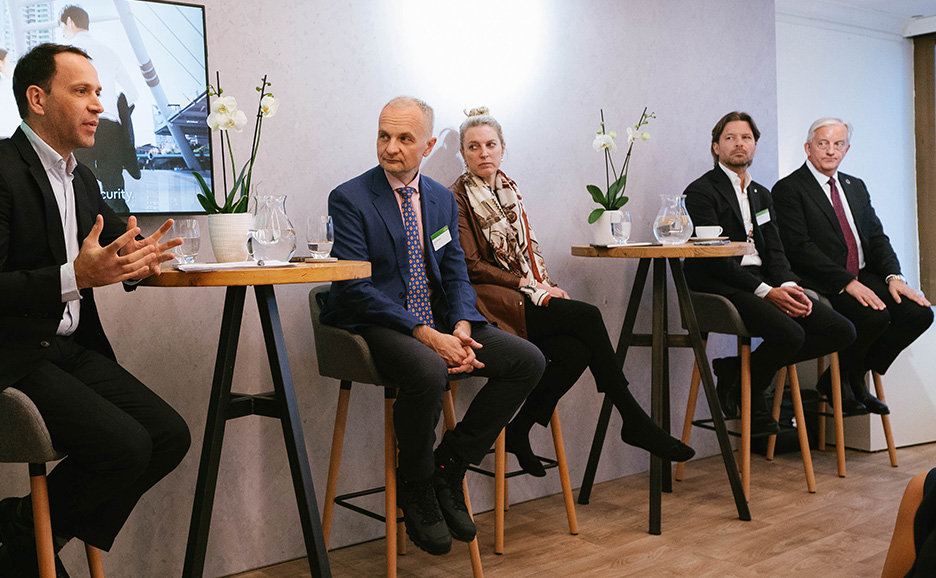Four ways to speed up sustainability

Article|2024-02-27
6 minute read
Fujitsu hosted a panel at the 2024 World Economic Forum with digital and financial experts, academics and NGOs to find out how to accelerate sustainability transformation.
Gone are the days when sustainability initiatives only existed to meet regulatory targets. Instead, leading organizations are finding that sustainability transformation is directly contributing to profit.
“It’s no longer a question of whether or not ESG is driving growth,” says ING’s Chief Commercial Officer Mark Pieter de Boer. “For us, it’s the single most important driver of growth.”
ING isn’t alone. Fujitsu’s 2024 Sustainability Transformation report finds that 70% of organizations have made sustainability a top business priority. But many are struggling to carry out some of the steps that will make it a success, including collaboration, data sharing, accessibility and visibility, and the right digital tools.
Collaboration helps unlock innovation by giving people the opportunity to share their thoughts in a more diverse pool of ideas and experiences. It also ensures a more equitable relationship between partners and suppliers who share similar goals for sustainability. Data sharing, accessibility and visibility enable companies to predict risks and demand, and gives them the information they need to encourage investment in sustainability. And digital tools power this data-driven, collaborative approach.
To discuss the way forward for sustainability initiatives, Fujitsu hosted a panel at the World Economic Forum in January 2024. The discussion concluded that there are four ways to ensure success:
-
Champion the cause
ING’s de Boer spoke about the importance of embedding a sustainability framework that would create a pioneering industry-wide standard that others can follow.
-
Unite behind a shared purpose
Carolien de Bruin, Senior Director for Equity Action at the World Business Council for Sustainable Development (WBCSD), agreed with de Boer, adding that a shared purpose encourages organizations to disclose best practices and unite on sustainability actions that require large investments.
-
Aim for mutual benefits
Misiek Piskorski, Professor of Innovation and Digital Transformation and Dean in Asia and Oceania at IMD Business School, acknowledges that organizations seek tangible returns on their investments. That’s why he believes that the most important way to accelerate sustainability initiatives is to make sure that all parties benefit from their collaboration.
-
Prioritize digital
But according to Graeme Beardsell, CEO Asia-Pacific at Fujitsu, no collaboration or data sharing is possible without a proper technical foundation and the right digital tools.
Champion the cause
ING, the global financial institution, has transformed its organization since 2016, creating culture and performance metrics that incentivize clients and employees around sustainability initiatives.
“The organization setup around ESG is becoming increasingly important,” says de Boer. “In the past two years we’ve had record results, driving over €100 billion of ESG loan assets.”
This tallies with Fujitsu’s latest research, in which 50% of executives say that sustainability transformation initiatives have directly contributed to their organization’s revenue and profit growth in some way to date.
De Boer attributes ING’s success here to its internal ESG framework that keeps employees credible, reliable and client-oriented, as well as to the ESG transition strategies it sets up for its clients. “No bank has historical data on new technologies,” he says. “So it’s hard for risk departments to greenlight large investments on, say, hydrogen.”
ING’s solution was to create transition plans that determine how a client can get to net zero based on three data sources: its Scopes 1, 2 and 3 emissions, its CapEx and its public data. “So ESG sits entirely in our commercial risk-decision making processes,” says de Boer.
According to de Boer, ING’s success in progressing sustainability goals both internally and for its clients has proven that ESG needs a clear methodology. “But we’ve realized that many banks are still lagging behind on this,” he says. “If the industry needs scaling up, then it’s our responsibility to bring other banks to our level.”
One example of how ING is bringing the industry together is through the Poseidon Principles, which were introduced by leading shipping financiers in 2019. Before this, financial institutions took different approaches to sustainability in the shipping sector. “This is something we developed with multiple banks,” says de Boer. “The principles set the standards for shipping companies with regards to decarbonizing their fleet.”
By championing a methodical approach to pursuing sustainability transformation, ING has established itself as a powerful voice on how financial services can meet sustainability goals. This approach has become somewhat of a sustainability benchmark in the industry, placing ING as a reliable and sought-after collaborator for banks that might be lagging. This encourages competitors to collaborate and share data, accelerating sustainability initiatives throughout the sector.
Unite behind a shared purpose
ING provides a clear example of how ‘championing the cause’ can even encourage competitors to collaborate on sustainability. But this isn’t always enough. According to WBCSD’s Carolien de Bruin, purpose is the secret to encouraging different stakeholders to collaborate and share data.
De Bruin says that WBCSD developed a 10-point action agenda which has been successful thanks to elevating the following purpose: to make sure that people aren’t forgotten in the sustainability equation. “Our agenda lists a number of areas that companies should manage proactively in their supply chains to mitigate risks and abuses, and foster resilience,” she explains.
Fifty-two organizations are currently working with the WBCSD on this agenda, and de Bruin says that the reasons why corporations are showing up for this initiative in the first place are value, opportunity and risk. “If we’re not supporting people on the transition to net zero, if we’re not investing in reskilling and upskilling the workforce for the new jobs being created, then we’re at risk of real and fast-approaching repercussions,” warns de Bruin.
Unilever’s living wage promise is one example of how organizations are investing in their workforces. The promise is a commitment by the consumer goods giant to ensure that everyone who directly provides goods and services to the company will “earn at least a living wage or a living income by 2030.”
De Bruin says this shows the lengths companies are willing to go to attract and retain talent. However, that’s not to say that the costs outweigh the benefits. “There are several other reasons, beyond brand image and customer loyalty, why the adoption of living wages can be viewed as an investment for success,” says Unilever’s Chief Supply Chain and Business Operations Officer, Reginaldo Ecclissato, in an article (*1) explaining why living wages drive value. Not only does elevating workers out of poverty stimulate demand, “creating more economic opportunities” – it also “strengthens value chain sustainability, performance and resilience.”
Ecclissato elaborated on the benefits at the 2023 World Economic Forum: “Employee engagement and productivity increase, people turnover reduces, and we have much lower costs in hiring and training people. Our value chains are much more resilient, [which is] a huge benefit to the business.” (*2)
Unilever’s actions have set a standard for other organizations that are involved in WBCSD’s 10-point agenda. “We’re now working with Unilever to translate the lessons learned from their efforts into some of the handbooks that we’re providing to our other 51 members within the WBCSD,” says de Bruin.
Aim for mutual benefits
CEOs and finance functions understandably can’t approve projects that have no return on investment. This explains why Misiek Piskorski, Professor of Innovation and Digital and Dean in Asia and Oceania at IMD Business School, believes that the way to accelerate sustainability initiatives is mutually beneficial outcomes.
Bayer, the agriculture, life sciences and healthcare organization, aims to help smallholder farmers by giving them ways to achieve better crop yields and more affordable crop protection products.
“This has a tremendous impact on farmers because that’s a new revenue source and improves profitability,” says Piskorski. “For Bayer, it helps them meet their sustainability goals and builds trust with clients.”
Digital is another area of focus for Bayer, which has collaborated with Fujitsu on a proof of concept for a tool based on quantum technology which aims to solve “complex challenges related to seed production planning and materials campaign scheduling.”
Again, this has benefits for both parties. For Fujitsu, it’s an opportunity to use its expertise and build up its partner ecosystem; for Bayer, it’s a chance to secure its client relationships by providing innovative solutions to complicated challenges.
Prioritize digital
Championing the cause, uniting behind a shared purpose and ensuring mutual benefits are important, but none of these would be possible without technology. In Fujitsu’s latest research, for instance, about half of organizations say that difficulty getting hold of necessary data is holding back their sustainability progress.
“A lot of companies are figuring out that successful sustainability transformation is only possible through digital transformation,” says Piskorski.
Fujitsu’s Graeme Beardsell agrees with Piskorski, saying that complex collaborative ecosystems must be supported by a strong technical foundation. Any business strategy, collaborative or otherwise, depends on visible and accessible data to monitor progress and demand and mitigate potential risks.
Beardsell explains that this has encouraged Fujitsu to partner with companies including Palantir, Microsoft, SAP and ServiceNow to build an ecosystem that can support data sharing across the supply chain. This includes embedding emerging technologies into client processes to improve operations and visibility.
“In Thailand, we’re working with companies that are looking to collaborate across the supply chain,” says Beardsell. “The aim is to certify the sustainability and environmental credentials of all the elements in their supply chain. As such, we’ve created real-time data management and are using our capabilities in high performance computing and AI to underpin that network – delivering real-time data. This allows companies to see whether their supply chain is enabling them to meet their sustainability goals.”
Cooperation needs tech support
In Fujitsu’s soon-to-be-published 2024 research report, 51% of organizations say that poor cooperation from stakeholders is a barrier to their sustainability initiatives. That’s a problem, given the expert panelists’ emphasis on the need for collaboration and data sharing.
Organizations can’t champion sustainability or lead on it without the emerging technologies that enable innovation. They can’t unite others behind a shared purpose without digital tools that enable discussions and spread information. And they can’t identify mutually beneficial outcomes without real-time data or analytical tools.
So technology underpins everything. As Misiek Piskorski says: “The confluence of digital and sustainability is the key to unlocking progress.”
For more information, look out for Fujitsu’s upcoming 2024 full research study.
Featured insights
Sustainability Transformation requires a united front

